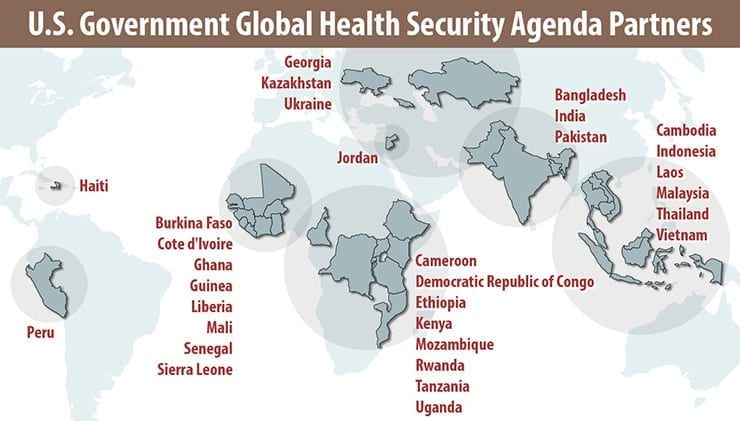 For nearly two decades, the Military Health System (MHS) has supported global public health surveillance to both protect military members and strengthen biosecurity capabilities with partner countries.
For nearly two decades, the Military Health System (MHS) has supported global public health surveillance to both protect military members and strengthen biosecurity capabilities with partner countries.
“Infectious disease does not respect international borders or government bureaucracies,” said Dr. Jonathan Woodson, assistant secretary of Defense for Health Affairs, during the recent Asia-Pacific Military Health Exchange. “Identifying and cultivating areas where our cooperation can be strengthened is something on which we all should be focusing.”
Global Health Security Framework
Launched in February 2014, the Global Health Security Agenda (GHSA) provides a five-year framework with clear targets and milestones to accelerate progress in strengthening public health systems needed to protect global health security.
The GHSA now includes 31 partner countries, and is an important framework guiding health security efforts for the DoD. GHSA oversight and coordination efforts for the military are led by the Defense Health Agency’s (DHA) Armed Forces Health Surveillance Branch (AFHSB) which supports force health protection activities to meet national security objectives.
“The MHS plays an important supporting role within the United States Government to prevent, detect, and respond to endemic and emerging infectious disease threats and is highly complementary to our on-going global health biosurveillance and force health protection mission,” remarked Dr. David Smith, deputy assistant secretary of Defense for Health Readiness Policy and Oversight. “Through its force health protection mission, MHS contributes to the GHSA by conducting global infectious disease surveillance and outbreak response with partners globally, and by leveraging these surveillance activities to inform countermeasure development.
The GEIS Network
An important contributing component to the health security effort is the DoD’s Global Emerging Infections Surveillance and Response System (GEIS), reaching more than 70 countries with biosurveillance engagement organized around emerging infectious disease program areas to include antimicrobial resistant (AMR), gastrointestinal, febrile and vector-borne, respiratory or sexually transmitted infections.
“GEIS works with 14 DoD research laboratories operating a regional network. We support endemic and emerging disease surveillance and response missions with host-nation ministries of agriculture, health and defense, as well as public and private universities and various nongovernmental organizations in order to inform combatant commands of the disease burden in their areas of operation and appropriate force health protection measures to undertake,” said Air Force Col. Carol Fisher, DHA Public Health director. “Because surveillance findings are routinely shared with other U.S. government agencies and respective host nations, these activities contribute to our national security by allowing us to aid public health prevention and treatment programs, and ability to contain disease before it crosses borders.”
Emerging Threat Surveillance and Response
AFHSB leveraged existing febrile and vector-borne infection control efforts in Liberia to support the recent Ebola outbreak response. The Liberian Institute for Biomedical Research served as a central hub for Ebola diagnostic testing with the help of the Naval Medical Research Unit-3 in Cairo, Egypt and two Maryland-based facilities, the Naval Medical Research Center in Silver Spring and the U.S. Army Medical Research Institute of Infectious Diseases in Frederick.
The GEIS antimicrobial resistant infections surveillance program helps U.S. civilian, military and regional U.S. and foreign public health authorities identify and respond to resistance threats, allowing policymakers to develop both infection control policy and therapy recommendations. GEIS has supported AMR surveillance programs in GHSA participant countries, including Peru, Jordan, Cambodia, Thailand, Kenya and Uganda.
GEIS has also supported five DoD overseas laboratories in developing standardized surveillance for norovirus (a virus that can cause acute gastroenteritis in humans) and enterotoxigenic Escherichia coli among U.S. military and traveler populations.
AFHSB provided subject matter expert support to U.S. Africa Command (AFRICOM) in their development of the African Partners Outbreak Response Alliance, a group of representatives from 12 countries – including GHSA participants such as Liberia, Ghana, Burkina Faso, Côte d’Ivoire and Senegal. This alliance works together to improve detection, response, and prevention of disease threats within their communities.
“We value the role that our GEIS activities play in support of GHSA,” said AFHSB Chief, Army Col. Michael Bell. “We are proud of the resources that we can bring to bear in handling endemic and emerging infectious disease threats. We recognize that these efforts are not only critical to U.S. national security interests, but also assist in keeping our forces healthy and ready to perform their duties.”

